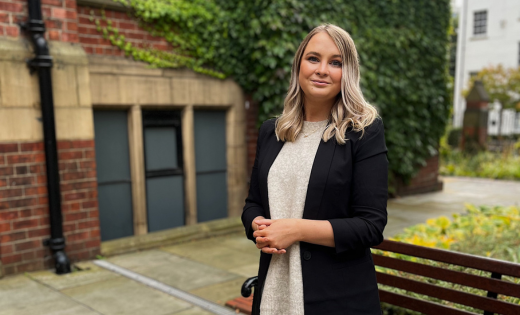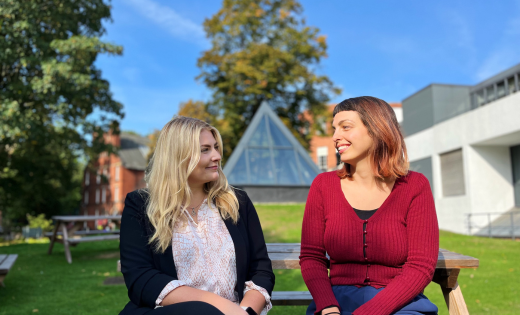Inside Track | Harassment and Misconduct Team
One year on, Charlotte Webster, Harassment and Misconduct Manager, offers a behind-the-scenes look at how her team provides specialist support to students and postgraduate researchers.
Charlotte Webster, Harassment and Misconduct Manager

Our community has the right to study, learn and participate in an environment free from unacceptable behaviours. The Harassment and Misconduct team was formed last year, providing new specialist support for students and postgraduate researchers following serious incidents including sexual violence, abuse, hate crimes, discrimination, bullying and harassment.
We offer a wide array of resources, one-on-one support, information, and guidance for both staff and students.
Meet the Team

The service comprises two full-time Harassment and Misconduct Advisers, Carys Corkhill (left) and Lorna de Fenzi (right). They bring a wealth of experience from their previous roles as Independent Sexual Violence Adviser and work in other Higher Education Institutions. As Harassment and Misconduct Manager, my role is focused on coordinating support for students, providing specialist advice, and analyzing trends and patterns in disclosure data and casework information.
In partnership with Andrea Kerslake, Assistant Head of Student Support, we are developing and delivering training for staff and students related to prevention and education. We also contribute specialist knowledge to University policy development.
How we support students
The Harassment and Misconduct team provides tailored one-on-one support for students, helping them understand their options for accessing therapeutic support, formal reporting processes, and navigating the practical implications following an incident. Our two full-time advisors offer a confidential, non-judgmental service that empowers students to make informed choices about their next steps. The team also provides guidance to students and visitors who have witnessed concerning incidents.
Our team collaborates with colleagues across the institution, such as Student Counselling and Wellbeing, Student Cases, LUU Help and Support, and our Police Liaison Officer. We also work closely with the wider Leeds community, including West Yorkshire Police and specialist charities.
This service builds upon the great work carried out at the University for years. By allocating additional resources and synthesizing student support, training provision, and prevention efforts, we aim to address harassment and misconduct incidents consistently and collaboratively.
Students can get in touch with the team through our Harassment and Misconduct web pages where they’ll also find a range of information and resources to explore support options, find guidance on how to support someone else, and get to know our team and what to expect from an appointment with us.
Helping you support students
Students will often disclose an incident to someone they trust, which can include staff members. Recognising this, we have developed a staff toolkit with information and resources to help staff make a referral, get in touch with the team for advice, sign up for a training event or roadshow, and access communications materials to raise awareness of the Harassment and Misconduct team.
Understanding what’s happening in our community
One of our core enhancements has been to develop and launch a new online disclosure tool. Our online forms invite members of our community to tell us if they have experienced or witnessed anything that has made them feel concerned. By providing their contact details, students and PGRs can connect with a specialist advisor to explore next steps.
If someone does not feel ready to access support, they can provide information anonymously.
Sharing information about incidents helps us understand what’s happening in our community so we can monitor trends and take action to prevent harmful behaviours at Leeds.
Students can access our disclosure forms in the ‘Explore Support’ section of our webpages.
What’s next?
Our work in this area is ongoing. It's crucial that we remain reflective and open to new ways of developing effective support for our community. Harassment and misconduct topics remain an important issue within society and, as such, a key focus for the HE sector. Alongside embedding our community’s voice at the heart of our work, we are informed by best practice across the sector, the Office for Students and specialist charities and organisations. The team regularly contributes to national practitioner spaces and has convened a local network of HE colleagues with responsibility for doing this work. This has been instrumental in establishing our plan for the next 12 months.
The team are presenting at a number of conferences and CPD events, sharing best practice and how we approach this work at Leeds. We also have updates on staff training, as we are developing a brand-new Dealing with Disclosures session in collaboration with colleagues across the institution and West Yorkshire Police. We’re excited to launch that at the start of 2024. You’ll also see our new campaign, focused on Sexual Violence Prevention and Education.
Posted in: My Week